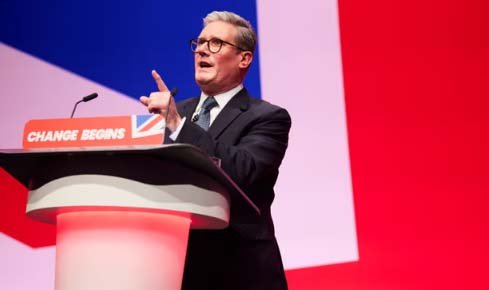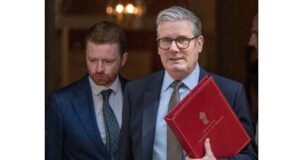
“Boris Johnson was such a numpty, have we got another numpty now?” asked Tal, a business analyst, after the end of the Labour party conference on Wednesday.
His question summed up the mood of the voters More in Common spoke to in a focus group in Hendon, a seat Labour won in July by just 15 votes. The group had largely switched from Conservative to Labour at the last election.
Many took a similar view to Claire, an office manager who said that she had made the switch even though “when I voted Labour I wasn’t 100% sure”, but she thought it had to be “better than what we had”. But after barely three months, the voters found themselves, in the words of Suzanne, a lecturer, “quite disappointed … I’m picking up really bad vibes”.
Labour’s party conference, or indeed any sense of what the new government was going to do to make their lives better, had barely cut through. Instead, for this group of voters, as with others More in Common have spoken to over the past few weeks, it was the decision to means-test the winter fuel allowance and the “freebies” saga that were shaping their impressions of Keir Starmer’s early premiership.
The winter fuel allowance was the decision the group were most angry about. None of them were pensioners, yet all of them worried that the decision to restrict the payment would leave elderly people vulnerable this winter. Keith, a company director, thought it was “absolutely disgusting”, while Nicola, who works in admin, said: “I don’t think it’s morally right. This is what these people rely on, to take it away could change everything.”
For Ken, a construction manager who voted Labour for the first time in July, it was enough to make him wish he hadn’t. If there was a glimmer of good news for the government, it was that this group didn’t object to the idea of means testing the payment, but rather they felt the pension credit threshold was too low, and too much of a cliff edge. Suzanne said: “I think it’s disgraceful what they’ve done. Some people are just missing the threshold. Some are over just by a pound and they’ve lost the whole thing.”
On political freebies, the group was slightly more split and a couple felt it was a non-story. Ken said: “It doesn’t really affect how he’s running the country. If someone offered me a free box at Arsenal I would bite their hand off for it.” John, a sales worker, said he found the media attention “quite childish”.
But for others, the donations went to the heart of what was wrong with UK politics. Keith went so far as to call it “corrupt”. Martyn, a teacher, said it made him question Starmer’s judgment because “the first weeks on the job should be when you’re at your best”. Tal added: “It’s not a good look.”
Perhaps most damagingly for the government, and again in common with other conversations with voters, some made a direct link between the decision to cut the winter fuel allowance and ministers accepting luxury goods. Nicola said: “I don’t think you can cut the winter allowance and then receive hundreds of thousands of designer goods for your wife.”
Although the mood was one of disappointment with Labour’s performance so far, it had not turned into the outright anger so often expressed at the Johnson, Truss and Sunak administrations. In fact, most of the participants were still willing to give them the benefit of the doubt. John said: “It can’t be easy with where we are from an economic perspective.” Tal added: “I think they are really trying.”
Most of the group also gave the government credit for pay deals to end public sector strikes. Ken said: “You can’t not have an NHS, you can’t not have a train service.” Nor did it seem as if the Conservatives were yet benefiting from Labour’s missteps . When asked about the Tory leadership candidates, not one member of the group could name them.
While voters’ views have not yet crystallised against the new government, expectations are low. Some of that is not the government’s fault – the public mood is generally gloomy. Last week, when More in Common asked the public to sum up Britain in one word, the most common response was “broken”. But in other areas, the government has made its own political weather. By taking the winter fuel allowance decision outside a budget it has become the defining policy for voters such as the ones we spoke to, while the freebies saga has led some to conclude that Starmer’s pledge to clean up politics was empty words.
The result? Asked to sum up how they felt about the government in one word, the group’s responses ranged from “lacklustre” to “rubbish”. If there is an opposite to a political honeymoon, this government may well be experiencing it.
 Weekly Bangla Mirror | Bangla Mirror, Bangladeshi news in UK, bangla mirror news
Weekly Bangla Mirror | Bangla Mirror, Bangladeshi news in UK, bangla mirror news







